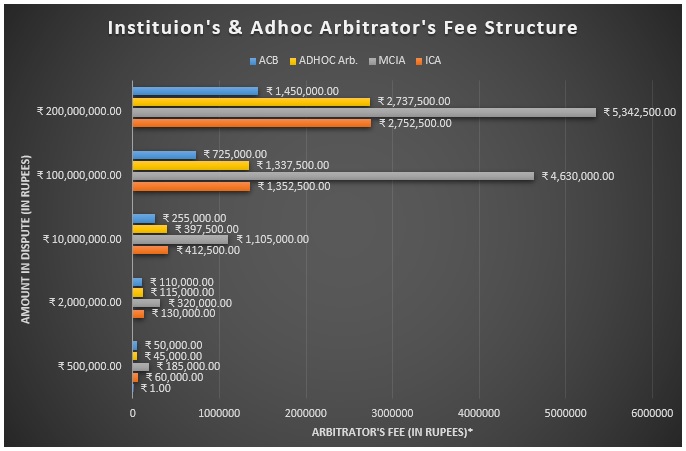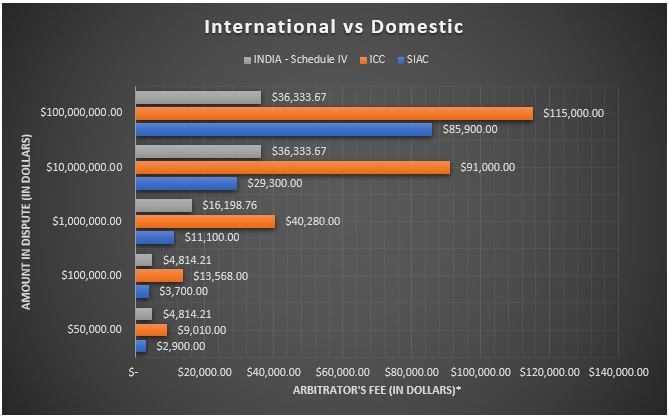INTRODUCTION:
Over the last few decades, there has been increasing denunciation of the role of arbitrators in India, especially in terms of the exorbitant fees charged by them. There have been calls to introduce fixed fees for Arbitrators to ensure the viability of arbitration as a dispute resolution process. However, not too late, in the year 2014 the Law Commission of India under the chairmanship of Justice AP Shah constituted an expert committee to release the 246th Report. The committee had put forth an array of recommendations as part of the "Amendment to the Arbitration and Conciliation Act, 1996" where the recommendation of Controlling Arbitrators' Fees was the most critical one of them all.1
In today's competitive business environment, the costs of litigation can often present a significant barrier to businesses seeking to pursue their legal rights. Disputes can have severe financial consequences for companies, particularly if a dispute cannot be resolved quickly or is protracted over several years. This article aims to address the status quo on the arbitrator's fee and address the possible ways to ensure arbitration is not just equitable and affordable but help foster more parties to adopt arbitration as their preferred method of dispute resolution in India.
EVOLUTION OF SCHEDULE IV:
The precursor to understanding the conundrum surrounding the arbitrator's fee is to understand how Schedule IV came about in existence. The Fourth Schedule was inserted into the 1996 Act via the 2015 Amendment, based on the 246th Law Commission report. The Report went so far as to call the fees set before the Schedule "arbitrary, unilateral and disproportionate." The proposed schedule was to deliver a model for the fixation of fees of the arbitrator and before the amendment, when a contract lacked such a stipulation, the Arbitral Tribunal could decide upon its fees.2
The problem with the earlier provision was that it restricted the autonomy of the parties which is supposed to be the nucleus of any arbitration proceeding. The high fee charged largely by ex-judge arbitrators has brought disrepute to the entire arbitration biome in India and led to the repulsion of arbitration in India as being a more favourable jurisdiction.
THE CONUNDRUM:
Now moving into the talk of the town in terms of arbitration is the judgment by the Supreme Court of India in the matter of Oil & Natural Gas Corporation Ltd. vs. Afcons GJV, where it had resolved various issues circling the Arbitrators' fee and those critical issues are gone into in detail in this article.
CONUNDRUM No. 1:
1.1 Whether the Arbitral Tribunal Can Unilaterally determine their fees.
The court's ruling held that an arbitrator cannot determine their compensation without consulting the parties, upholding the significance of party autonomy. The Court found that the fee model proposed in Schedule 4 is not mandatory and that parties to an arbitration may choose another fee structure for the arbitrator. However, the Fourth Schedule shall become the default pick if the parties cannot agree upon a fee. 3
1.2 Interpretation Of "Costs" And "Fees"
The court held that the term "costs" and "fees" are two different paradigms, where cost shall include the arbitrator's fees. However, an arbitral tribunal cannot pass a binding order on its fees, while determining the amount of costs. The Court also observed that an arbitrator can demand deposits and supplementary deposits since these advances for costs are provisional.
It was held that the arbitrator in terms of Section 39(1), can only exercise a lien over the arbitral award if any payment remains outstanding. A party can approach the court to review the fees demanded by the arbitrator under Section 39(2) if it believes that the fees are unreasonable.
1.3 Directives Governing Fees of Arbitrators In Ad Hoc Arbitrations
The Court framed certain guidelines via Article 142 of the Constitution of India, concerning the fee of an arbitrator in an Ad hoc arbitration, which are as follows:
- Upon the constitution of the arbitral tribunal, there shall be a maximum of four hearing to finalise the terms of reference ("TOR") and the arbitral tribunal must set out the components of its fees as a tripartite agreement.
- An arbitrator appointed by the parties in terms of the arbitration agreement, is liable to be paid as per the arbitration agreement. However, where the arbitrator finds the fee stipulated therein unacceptable, he must clarify his proposed fee in the preliminary hearings. In the event of any disagreement, the arbitrator(s), may decline the assignment.
- Once the TOR have been finalised and issued, it would not be open for the arbitrator to vary either the fee fixed or the heads under which the fee may be charged. The fees fixed, however, may be revised upon completion of a specific number of sittings and the quantum of such revision should also be mentioned clearly.
- Where the arbitrator is appointed by the Court, and the Court does not specify the arbitrator's fee then in such case, the arbitrator and the parties should agree upon the TOR as mentioned hereinabove.
- The Court also clarified that there can be no unilateral deviation from the TOR, which is a tripartite agreement.4
CONUNDRUM No.2
Whether the term "sum in dispute" in the Fourth Schedule to the Arbitration Act, means the cumulative total of the amounts of the claim and counter-claim.
The Court analysed various provisions of the Act, where references to claim and counter-claim and observed the following:
- The Act treats claims and counter-claims at par and the same procedure and timelines must be followed for both.
- The Act allows the arbitrator to fix the deposit of separate costs for claims and counter-claims, considering the same to be distinct proceedings.
The Court finally concluded that in so far as institutional arbitrations are concerned, parties shall be bound by the respective rules of the institutions and the arbitrator's fee shall also be payable as per the respective rules.
However, the in case of ad-hoc arbitration, where the Fourth Schedule is applicable, the arbitrator's fee should be calculated separately for a claim and separately for a counter-claim and not on the cumulative value of the two.
CONUNDRUM No.3
Whether the ceiling of ₹30,00,000 in the entry at Serial No. 6 of the Fourth Schedule of the Arbitration Act applies only to the variable amount of the fee or the entire fee amount
While dealing with this issue, the Court held that the ceiling of ₹30,00,000 in entry at Serial No. 6 of the Fourth Schedule applies to the sum of the base amount and the variable amount, and not just the variable amount. Therefore, the maximum fee payable to the arbitrator shall be ₹ 30,00,000.
CONUNDRUM NO. 4
Whether the ceiling of ₹30,00,000 applies as a cumulative fee payable to the arbitral tribunal or it represents the fee payable to each arbitrator
The Court held that the fees provided in Fourth Schedule are for individual arbitrators, regardless of whether they are a member of a multi-member tribunal or sole arbitrators. However, the Court clarified that a sole arbitrator would be paid 25% over and above the ceiling amount per the fourth schedule.5
THE STATUS QUO ON ARBITRATION FEES IN INDIA:
The Arbitration regime in India after the Supreme Court judgment has achieved some much-needed clarity specifically for an Ad hoc arbitration vis-à-vis the Fourth Schedule. But to understand the actual investment one needs to make for an arbitration proceeding, one needs to compare Ad hoc arbitration with institutional arbitration both on the domestic and international front.
DOMESTIC PERSPECTIVE
The below chart abridges and provides a bird's eye view of the current fee scenario in India by comparing the fee structure of Arbitrators at some of the prominent Arbitration Institutes in India such as the Arbitration Center Bangalore (ACB), Mumbai Centre for International Arbitration (MCIA), Indian Council of Arbitration, Delhi (ICA) versus the Ad Hoc arbitration under the Fourth Schedule. One needs to take resort to either an Institutional arbitration or Ad-hoc arbitration based on the type and complexity of the dispute for an efficient resolution and not purely guided by the fee structure.6

*The chart is an approximate depiction of the fee structure of institutes at various levels of dispute amounts based on information available in the public domain.
* The amount depicted above is excluding the administration fee (charged for facilitating the Arbitration proceedings) which is over and above the arbitrator's fee.
INTERNATIONAL PERSPECTIVE
Though a lot of hue and cry were made in relevance to the arbitrator's fee in India, a quick comparison of the arbitrator's fee at two prominent international institutes that are the go-to places for arbitration and one can conclude that the fees charged by arbitrators in India under the Fourth Schedule are inexpensive. Though many may contest this statement by citing the goodwill and experience of such international institutes in the field of arbitration, the fees charged by them are simply exorbitant and unfounded and in no way justified. The below chart is a depiction of the two prominent international arbitration institutes, compared with the fee structure of an arbitrator under the Fourth Schedule in India.7

*This chart is an approximate depiction of the fee structure in USD for simple comparison and the fees may vary depending on the exchange rate at any given time.
*The calculated fee is based on the Fees schedule shown on the respective websites of the Institutes in the public domain, which may vary depending on the institute.
THE WAY FORWARD:
The judgment in the case of Oil & Natural Gas Corporation Ltd. vs. Afcons GJV settled many crucial questions orbiting around arbitrators' fees and has provided some much-needed insight into the various provisions of the Arbitration Act in this respect.8 The guidelines provided under the judgment shall protect the parties from being forced to accept a unilateral and arbitrary fee, if any, fixed by arbitrators and at the same time has granted liberty to an arbitrator to accept or to reject any unreasonable or unconscionable fee, not commensurate with the efforts required while adjudicating disputes between the parties. This judgment has further paved the way in bringing more clarity and transparency concerning the law governing arbitrations in India.
Now on to the matter of affordability, the fee structure of Arbitrators in India, especially after the insertion of the Fourth schedule, has put India in a better place especially in comparison with its international counterparts, at least in terms of the affordability of an arbitration proceeding. Thus, one needs to recognize the value of Arbitration and the efforts that have gone into making arbitration in India affordable and promoting India as a jurisdiction that is pro-arbitration.
Footnotes
1 https://ibclaw.in/annexure-246th-report-on-amendment-to-the-arbitration-and-conciliation-act-1996-law-commission-of-india-aug2014/?print-posts=pdf
2 https://www.livelaw.in/law-firms/law-firm-articles-/arbitral-fee-supreme-court-fourth-schedule-arbitration-and-conciliation-act-ongc-law-commission-report-pioneer-legal-215942#
3 https://www.scobserver.in/reports/fixing-arbitrators-fee-judgment-pronouncement/
4 https://www-barandbench-com.cdn.ampproject.org/c/s/www.barandbench.com/amp/story/law-firms/view-point/the-viewpoint-arbitrators-fee-supreme-court-settles-the-law
5 https://www.scconline.com/blog/post/2022/09/01/arbitrator-cannot-decide-own-fee-fourth-schedule-arbitration-costs-arbitral-tribunal-justice-sanjiv-khanna-partially-dissents/
6 Schedule 4 – Arbitration and Conciliation Act 1996 / Fees schedule from ACB, MCIA & ICA website.
7 Schedule fees of SIAC and ICC from their official website and Fourth Schedule of Arbitration Act, 1996 for Indian Arbitrator's fee.
8 https://main.sci.gov.in/supremecourt/2021/28254/28254_2021_2_1501_37867_Judgement_30-Aug-2022.pdf
The content of this article is intended to provide a general guide to the subject matter. Specialist advice should be sought about your specific circumstances.



